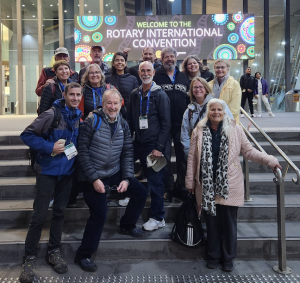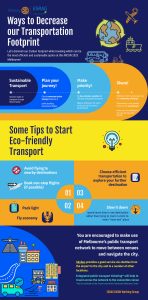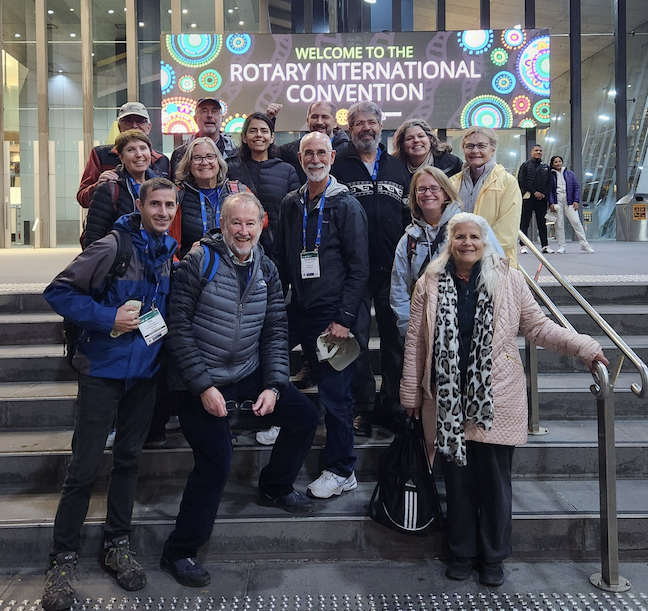by Deniz Vural, ESRAG Secretary
The ESRAG Rotary International Convention (RICON) Working Group (WG) is on a mission to make Rotary events more sustainable and eco-friendly. We want to encourage Rotary Family members from all around the world to get involved in making our environment healthier and combating climate change. For integrity, we need to walk the talk by reducing the adverse environmental impact of Rotary meetings. This article summarizes key insights from ESRAG’s eco-friendly contributions to the Rotary International Convention in Melbourne.
In four years of work culminating in the Sustainable RICON at Melbourne, ESRAG’s team focused on six areas: Education, Awareness Building, Venue Management, Food and Services, Transportation, Accommodation, and RICON Logistics. We built a massive resource library over these years, full of ideas to make future RI conventions and regional events more sustainable.

RICON attendees about to depart on an evening bat tour, one of the environmental excursions ESRAG planned with the HOC. WG member Vic Grosjean is in the front row on the left, next to ESRAG Oceania Chapter Chair Ted Waghorne.
One of the critical factors contributing to our success in making RICON more sustainable was our commitment to collaboration. It’s essential to partner with the Host Organizing Committee (HOC) responsible for the Rotary event you aim to make eco-friendly. Engage with the ESRAG Board, regional ESRAG chapters, and the hosting clubs. Collectively, scrutinize every facet of the event to ensure its environmental friendliness.
Kitchen tips: how to plan and prepare a Sustainable RICON
For the Melbourne RICON, we started by creating a sustainability matrix. It’s our master plan, showing what projects we want to do, how much they’ll cost, how big an impact they’ll have, how long they’ll take, and who’s in charge of them.
We follow a step-by-step process with five phases: planning, implementation, measuring, offsetting, and reflection. In the planning phase, we look at things like making sure everyone has a great time, using the latest tech, managing the event smoothly, taking care of the House of Friendship, spreading the word, helping our volunteers, and being inclusive.
Communicating and building trust and friendship with the Host Organizing Committee is crucial. For the Melbourne RI Convention, most of the Host Organizing Committee really cared about the environment and tried to follow our recommendations, even when the budget was tight.
Time to eat the fruits of our labor: key achievements
Here are some cool things we achieved, which you can replicate:
- We succeeded in getting environmental topics into convention communications like newsletters and the convention website.

- The 2023 Convention offered significantly more sessions on environmental sustainability than previous RICONs. We’re really stepping up our game!
- By using eco-friendly practices like less printing and no bags, we reduced participants’ carbon footprint at the convention.
- We employed QR codes and digital resources for swift, effortless, and eco-friendly information sharing.
- We’ve introduced some awesome tools, like the Green Events Handbook and the Flight Carbon Calculator.
- We created exceptionally captivating AI-generated music, generating excitement around the Sustainable Convention for the first time.
- We had an amazing team of volunteers who spent three years doing research on sustainability. They really knew their stuff!
Happy Learnings:
Of course, we’ve also gained valuable insights which we’re sharing below to help you in organizing Rotary events in the future. Several relate to teamwork, and others to best practices in sustainability.
- Commit to Sustainability: Ensure a dedicated budget and volunteer team focused on sustainability. Build close collaboration between the HOC, ESRAG Regional Chapter (based in/near the Convention region), and ESRAG Board to support eco-friendly initiatives.
- Ensure sustainability leadership: Make sure there’s always an ESRAG Board member in the ESRAG Working Group and RICON planning meetings to strengthen awareness and commitment to sustainability. The ESRAG Directors can also bridge to other Rotary leaders to reinforce the goals and actions you’re recommending to the HOC.
- Plan ahead for success: Plan future conventions three to four years ahead to have enough time to get things right in terms of appearing on the RI’s list of approval and start realizing.
- Foster global collaboration and continuity: Make sure HOCs from different countries and conventions are serving together through a committee structure so they can share knowledge and sustain progress towards net-zero Rotary events.
- Align with the HOC’s Mission: Clearly communicate how sustainability efforts contribute to the HOC’s mission, enhancing the relevance and impact of research work.
- Flexibility in HOC meetings is especially crucial during the final 12 months, to accommodate professionals with busy schedules.
- Leverage tools like the Carbon Flight Calculator to raise funds for Rotary environmental projects.
- Optimize outreach: Maximize the use of promotional videos, fliers, and convention resources to deliver the sustainability message to a wider audience.
- Foster engaging communication: Let’s ensure that our communication is open, flexible, and engaging to attract interested individuals, especially younger professionals who can truly make a difference!
- Advocate for uniforms, accessories, and handouts consistent with sustainability goals (for example, reducing single-use plastic and solid waste).
- Measure the event’s environmental impact: after the convention, include questions about sustainability in RI’s survey to measure the environmental impact.
A Friendly Conclusion:
We believe that sustainability is a big deal in Rotary. Many Rotary members want to make their events greener and more environmentally conscious, especially Rotary International Conventions (RICONs). As the environmental Rotary Action Group, we’re promoting true sustainability in Rotary gatherings. Our goal? To lead by example, making Rotary events the epitome of eco-friendliness and responsibility.
A growing number of convention venues are on board, aiming for ‘green’ and ‘net zero’ events. But to truly achieve ‘green’ status, both RI and the Host Organization Committee (HOC) must meticulously plan and budget for cutting-edge green initiatives. It’s essential to communicate these eco-friendly practices to the entire Rotary community.
ESRAG’s Working Group has made significant progress in promoting sustainability at RICONs. They’ve learned valuable lessons and are eager to keep advancing these principles with the help of volunteers.
ESRAG RICON Working Group
ESRAG Director Deniz Vural is a researcher at the Alfred Wegener Institute in Germany, where she focuses on changing shoreface dynamics in the western Canadian Arctic. As an enthusiastic climate ambassador, she pursues science communication initiatives to enhance public awareness of climate change and polar-related topics. Deniz is currently a member of two districts: RAC Tuzla (D-2420) and RC Eurasia (D-2420) in Istanbul, Turkey, and RAC Berlin International (D-1940) in Berlin, Germany.

